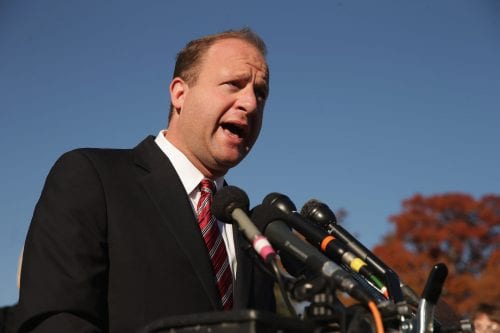WASHINGTON — Marijuana now has its own official club in Congress, thanks to Colorado congressman Jared Polis and three of his colleagues.
The Boulder lawmaker on Thursday joined with fellow Democrat Earl Blumenauer of Oregon, as well as Republicans Dana Rohrabacher of California and Don Young of Alaska, in launching the Cannabis Caucus — a group dedicated to promoting and protecting the nascent industry of legalized weed.
“We’re really at the tipping point on marijuana reform,” said Polis, who highlighted the growing number of states that have legalized for various uses. “For the first time, it’s a majority of Americans that will have access to medical or recreational marijuana.”

The effort comes at a critical time for the industry. Though it’s made strides nationally, and settled comfortably in Colorado since sales of recreational marijuana began in 2014, there remain a number of pressing issues — starting with President Donald Trump’s appointment of Jeff Sessions as U.S. Attorney General.
The former Alabama senator has raised concerns about the drug and said previously that “good people don’t smoke marijuana.” The attitude has prompted anxiety among cannabis companies who are nervous that federal authorities under Trump and Sessions could take a more combative stance toward states that have legalized marijuana.
“Many of us have expressed concerns about the new attorney general,” Polis said. “We’re also cautiously hopeful that President Trump will maintain a commitment he made on the campaign trail where he said it would be a state issue.”
More
Formation of the caucus: How Congress is getting serious about cannabis amid White House uncertainty
Federal scenarios: What will be AG Jeff Sessions’ first move on marijuana?
Legislation: House bill seeks to protect individuals in legal marijuana states from the feds
Subscribe to our newsletter here.
He added the Cannabis Caucus also will be active on legislation related to marijuana. “Issues ranging from banking to tax deductions to employment issues to potential for enforcement,” said Polis, who highlighted his own bill that to regulate weed like alcohol.
The new Cannabis Caucus will be among more than 200 different issue-related groups that have attracted like-minded members of the House. They range from the serious, such as the Bipartisan Taskforce for Combating Anti-Semitism, to groups that have rallied around specific causes or industries, including the Bourbon Caucus, the Motorcycle Caucus and the Rugby Caucus.
Talking marijuana reform in Washington
Here’s what the founding members of the Cannabis Caucus had to say at a news conference Thursday:
JARED POLIS, D-Colorado
“We’re really starting to see policymakers view the cannabis industry more favorably for what it is.”
The industry, Polis said, provides money for schools, creates jobs and bolsters the economy as opposed to supporting cartels and addicts.
This caucus “is an opportunity to show that the consumers and entrepreneurs in the marijuana industry are an important part of the American economy and there’s an impact on jobs if the federal government doesn’t repeal this outdated provision,” he said.
The next challenge, he said, is to take the model adopted by states such as Colorado and Washington “and enable all states to follow it — free from federal bullying and federal interference.”
The organization is seeking a commonsense approach to address “antiquated provisions” equating marijuana to heroin, he said.
“We don’t want to be a place where we rely on the goodwill of which side of the bed any attorney general wakes up on at any given day. That’s why we are pursuing statutory changes.”
DON YOUNG, R-Alaska
“You have to be for states’ rights or against states’ rights.”
DANA ROHRABACHER, R-California
Rohrabacher spoke of his friend and colleague Jeff Sessions as a man of principle and a man of honor. And although he may disagree with the principles of the caucus, Sessions is “someone who understands the president of the United States is the one who makes the policy for the executive branch.”
To Rohrabacher, it’s a matter of supporting the individual freedoms supported by the U.S. Constitution. The Founding Fathers did not want the federal government to interfere in people’s personal freedoms, he said.
Supporting states’ rights and independent freedoms should remain consistent: “I’m sorry, you can’t make that argument over here and then just ignore the fact that it’s applicable to this other area of decision-making.”
Rohrabacher added that the caucus needs to “touch people’s hearts as well as their heads,” saying the issue is critical to some Americans’ health and well-being.
“People are suffering. The law is wrong. We have a caucus together, a bipartisan caucus. We’re going to change that situation.”
EARL BLUMENAUER, D-Oregon
Concerning taxes and banking, Blumenauer mentioned IRS code 280E, which disallows credits and deductions for income generated from the sale of controlled substances. He said a fix will be proposed via standalone legislation, but could be achieved “in the context of the back and forth of tax work.”
He also noted last year that about 20 members of Congress participated in a bipartisan working group on marijuana issues.
